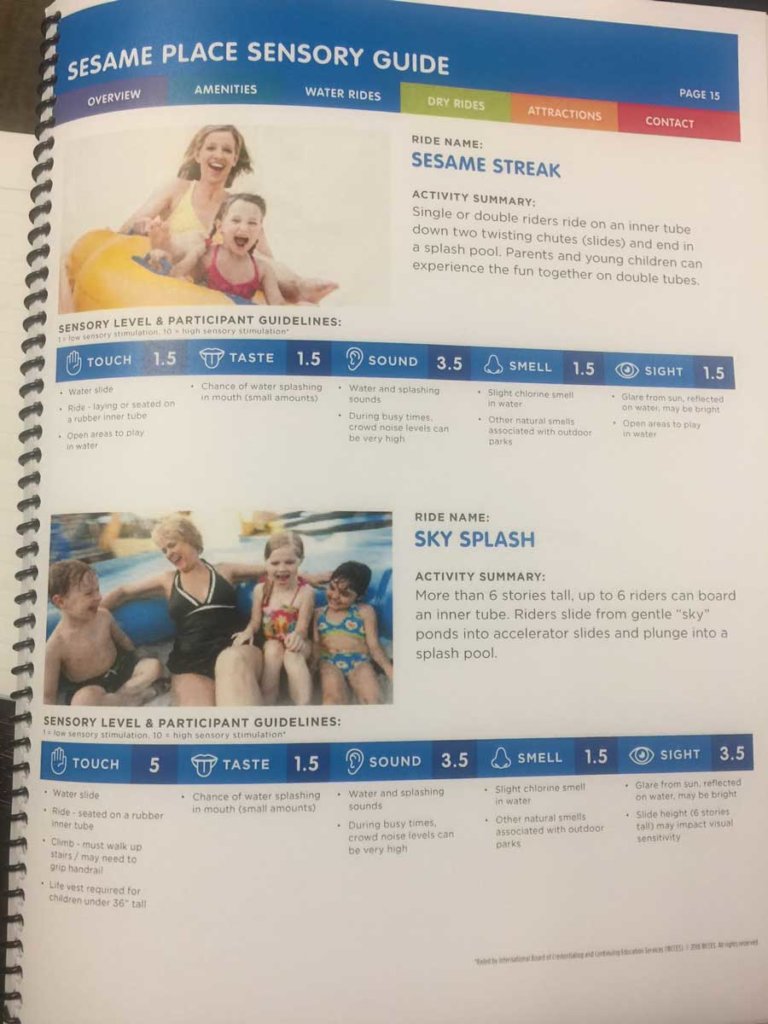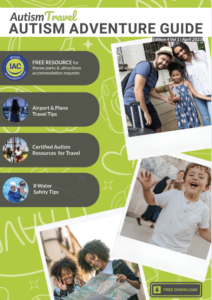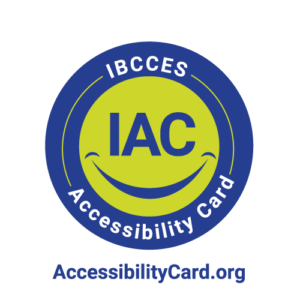 For a child on the autism spectrum, traveling with autism can be a huge challenge. However, when a child with autism finds a new place they enjoy visiting it can also be a catalyst to encourage them to expand their horizons.
For a child on the autism spectrum, traveling with autism can be a huge challenge. However, when a child with autism finds a new place they enjoy visiting it can also be a catalyst to encourage them to expand their horizons.
Traveling with a Child with Autism Requires More Planning and Preparation
Traveling is meant to be enjoyable, but it can quickly turn into one big headache. Between planning, getting to your destination and carrying out vacation activities, anything can happen especially when you have a child with autism. The booming travel industry is seeing a huge demand for accommodations that will serve families traveling with children who have autism and other special needs.
Traveling with a child who has autism can be stressful and many families miss out on the vacation of a lifetime because they don’t want to deal with the hassle.
Luckily, with programs like IBCCES’ Certified Autism Center (CAC) training and Certified Autism Travel Professional (CATP) training, popular travel destinations and travel professionals are becoming well-versed in autism. With trainings like these, there’s no excuse for the travel industry to be unprepared.
While travel professionals are getting ready for your arrival, here are ten tips for a smooth, fun trip when traveling with a child who has autism.
1. Apply for a TSA disability notification card:
Airport security can be a total nightmare. A TSA disability notification card alerts TSA employees that the traveler has a disability or medical condition. This is an important step in case screening procedures need to be modified. Though the card doesn’t exempt you from a screening it can prepare the TSA staff so that they can handle the situation effectively and potentially conduct the screening in a private area. You can download a TSA disability notification card here.
2. Know the Difference Between Autism Friendly vs. Autism Certified
The difference between a travel destination that is autism friendly and one that is autism certified is like night and day. Autism operates on a spectrum, meaning no two children with the condition are alike. A Certified Autism Center (CAC) is trained to accommodate each child’s unique needs and is able to provide appropriate care to ensure every child and family has an enjoyable, safe experience. In fact, through IBCCES’ training, at least 80% of an organization’s staff has to be trained, fully equipped and certified in the field of autism to be considered a CAC. Continued training and education are expected of CACs so that they can remain autism experts and stay up to date on the latest medical research. Here is a full list of autism certified destinations by IBCCES.
3. Ask for a TSA passenger support specialist:
Did you know a TSA passenger support specialist can be requested at any airport? Their role is to provide support to people who have disabilities or medical conditions before and during the security screening process. A TSA passenger support specialist will be with you from the moment you arrive at the airport and will guide you through the entire process. You can request a TSA passenger support specialist by calling 855-787-2227 at least 72 hours before your trip. Just provide your flight details!
4. Help Familiarize Your Child with Vacation Locations Before Arrival (Including Videos!)
Be sure to map out your trip and choose destinations and rest stops that are prepared to accommodate your child’s needs. If planning a trip by car, check accessibility ahead of time at your final destination as well as any places you’ll be stopping or staying en route.
If destinations have pre-arrival video clips this will help your child get accustomed to the environment before they arrive.
Once you’ve determined a safe arrival, you’ll want to consider any items you’ll need for bedtime, bathtime and mealtimes. Try calling your destinations to ask what they provide so that you can bring whatever they don’t have. If a destination seems unable to meet your needs please don’t hesitate to ask for other recommendations in the area. Perhaps the knowledge that they lost a potential customer will inspire action and encourage them to improve their accessibility.
Lastly, plan to go to destinations that have a CAC because they are trained to handle your specific situation and will help you plan your trip. Always use a travel agent who is a Certified Autism Travel Professional (CAPT). You can find a list of qualified travel agents here.
5. Consult with your Physician’s Child or Therapist: Get a Travel Pack!
It’s a good idea to talk with your child’s physician or therapist before your trip. Ask for recommendations and tips when it comes to certified destinations. You can also ask them for a special “travel pack” with items you may need in case of an emergency.
Some things your travel pack might include are:
- A list of any prescription drugs your child is taking and a copy of each prescription
- A physician’s description letter of your child’s condition and needs in case of an emergency
- Phone numbers, email addresses, and/or pager numbers of your home physicians/specialists
- Recommendations for physicians and specialists in the area you’re visiting
- Health insurance cards and phone numbers (be sure you’ve reviewed your insurance policy before you leave
- because many require prior approval before out of town emergency room or doctor’s visits)
- Phone numbers of any necessary medical supply company
Some medical professionals you may want to consult for guidance are speech language pathologists, occupational therapists, Certified Autism Specialists, ABA therapists or Board Certified Cognitive Specialists.
6. Find Transportation that will meet your Specific Needs
If your goal is to make your trip as stress-free as possible, transportation can be a critical choice. Here are several questions to consider:
- Is your destination close enough to travel by car?
- Would air or train travel put you too far from emergency medical personnel for an extended period?
- If your child requires specialized seating support, what type of travel works best with their seating system?
If you’re working with a travel agent, be sure to ask about special guidelines or requirements for passengers with disabilities. A wonderful source of detailed information about the logistics of planning accessible travel by plane, train, bus and ship is “Barrier-Free Travel: A Nuts and Bolts Guide for Wheelers and Slow Walkers” by Candy Harrington.
The best source for help is to ask a certified travel agent who is a Certified Autism Travel Specialist.
7. Remember, it’s a Family Trip
If it’s your first trip away from home, you will naturally be concerned with how your child with autism is managing, but don’t forget your other family members! Be sure you give some quality time and attention to your other kids as well. While your child with autism is napping or occupied with a favorite toy, chat with your other family members and reconnect. They will thank you by having a much more cooperative and supportive attitude when your attention has to be focused elsewhere. All CAC destinations also provide accommodations for the whole family.
8. Look for a Sensory Guide for Every Ride or Activity
 Certified destinations will be well aware of the sensory needs of your child. Ask your destination for a sensory guide for each ride or activity so you can decide whether it is appropriate for your child or not. These guides are put together by a team of experts that include healthcare professionals, individuals on the spectrum and specialists in the travel industry.
Certified destinations will be well aware of the sensory needs of your child. Ask your destination for a sensory guide for each ride or activity so you can decide whether it is appropriate for your child or not. These guides are put together by a team of experts that include healthcare professionals, individuals on the spectrum and specialists in the travel industry.
9. Don’t Expect Perfection
Traveling, like anything else, is an acquired skill. If your first trip doesn’t turn out perfectly, don’t give up! Take time to sit down and analyze what went wrong.
Questions to ask after your trip
- How could you have prepared differently or more effectively?
- Which of your destinations and stopovers worked well?
- Which ones just need to be crossed off your list?
Chances are, if your holiday trip was to visit family, you’ll be traveling that road again. Time spent establishing relationships can be time well invested! Just remember, every trip is a learning experience for you and a precious family memory for your children, whatever their needs.
Traveling with a child who has autism takes effort and planning, but it doesn’t have to be impossible. By following these ten tips you’ll be far more likely to have a successful trip, unforgettable memories and even some time to relax!



 IBCCES Accessibility Card Now Available as a Mobile App
IBCCES Accessibility Card Now Available as a Mobile App